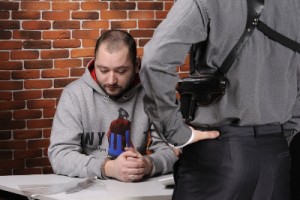Being taken to the police station to answer questions is both frightening and intimidating. If you are arrested, it makes the experience even more stressful. Your first inclination may be to try to tell your side of the story or “talk your way out” of the situation. Unfortunately, if you have been arrested or you are being investigated for committing a crime, very little good can come from you agreeing to answer questions for the police or any other party representing the judicial system.
Is It Okay To Talk To The Police Before They Read My Rights?
When police officers are conducting an investigation, they will interview witnesses and potential suspects. They may not tell you that you are a suspect; therefore, you must be very careful when you answer questions by the police officer during an investigation. It is never okay to lie to an officer but it is okay for you to politely refuse to answer his questions. The information a police officer gains during these pre-arrest interviews often helps the officer establish probable cause to make an arrest.
If you are worried that refusing to answer questions makes you appear guilty, simply inform the officer that you have been advised not to answer any questions until your attorney is present. The Fifth Amendment to the Constitution gives you the right to remain silent and, in most cases, it is in your best interest to invoke this right. If you do decide to answer questions, you must understand that any answers you give may be used against you in court.
But What About My Miranda Rights Before I Answer Questions?
A police officer is not required to read you Miranda warning until he questions you after you have been arrested. In fact, an officer may arrest you and never read you the Miranda warning. If the officer does not intend to question you after you are arrested, he is not required to give you the Miranda warnings. There could be a situation, albeit extremely rare, where someone might not receive his Miranda rights at all. Again, that is typically not the case because the police want to ensure that anything you say can be used against you during the trial.
If for some reason the officer did ask you questions after you were arrested and you answered them without the Miranda warnings, failure to read you your rights would not result in an automatic dismissal of the charges. The only result would be that the answers you gave to those questions would not be admissible in court. This is one of the main reasons why officers always read a suspect his or her Miranda rights if it appears that the suspect is about to say anything incriminating. The officer wants to preserve the right to use those statements against the suspect.
Your Right to Remain Silent
After answering the question about who you are by giving your name and legal residence, it is almost always in your best interest to refrain from talking the police without an attorney present. Never waive your right to remain silent and agree to answer questions as this can only lead to more questions.
Invoke your right to remain silent by stating specifically, “I will not answer questions without my attorney present. I want an attorney.” Be specific! Do not say, “Do you think I need an attorney” or “Maybe I should have an attorney before I answer questions.” This is not the same as invoking your right to remain silent and requesting an attorney. Your right to remain silent is a right that the police cannot take from you. Use it and call our office as soon as possible to consult with an experienced criminal defense attorney.
Contact an Experienced Jacksonville Criminal Defense Attorney
“Attorneys Who Aggressively Protect Your Rights”
The Trevor J. Avery Law Firm, LLP is a full-service Jacksonville Criminal and Civil law firm that is committed to providing results-driven legal representation to businesses and individuals seeking an alternative to large-firm representation. We focus on getting you the results you want while offering you a cost-effective solution to your legal needs. We understand that we work for our clients; therefore; our attorneys communicate regularly with each client to ensure that the client knows what is going on with the case.
When you have legal problems, you need an experienced legal professional in your corner. No matter the case, you should have an attorney working for you who knows the law and who has the experience to get results. We represent clients throughout Duplin County, Onslow County and the surrounding communities. Call our office at (910) 405-8459 or contact us online today for a free case evaluation.

